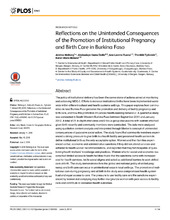| dc.contributor.author | Melberg, Andrea | en_US |
| dc.contributor.author | Diallo, Abdoulaye Hama | en_US |
| dc.contributor.author | Ruano, Ana Lorena | en_US |
| dc.contributor.author | Tylleskär, Thorkild | en_US |
| dc.contributor.author | Moland, Karen Marie | en_US |
| dc.date.accessioned | 2016-09-05T10:57:39Z | |
| dc.date.available | 2016-09-05T10:57:39Z | |
| dc.date.issued | 2016-06-03 | |
| dc.Published | PLoS ONE 2016, 11(6):e0156503 | eng |
| dc.identifier.issn | 1932-6203 | |
| dc.identifier.uri | https://hdl.handle.net/1956/12724 | |
| dc.description.abstract | The policy of institutional delivery has been the cornerstone of actions aimed at monitoring and achieving MDG 5. Efforts to increase institutional births have been implemented worldwide within different cultural and health systems settings. This paper explores how communities in rural Burkina Faso perceive the promotion and delivery of facility pregnancy and birth care, and how this promotion influences health-seeking behaviour. A qualitative study was conducted in South-Western Burkina Faso between September 2011 and January 2012. A total of 21 in-depth interviews and 8 focus group discussions with women who had given birth recently and community members were conducted. The data were analyzed using qualitative content analysis and interpreted through Merton's concept of unintended consequences of purposive social action. The study found that community members experienced a strong pressure to give birth in a health facility and perceived health workers to define institutional birth as the only acceptable option. Women and their families experienced verbal, economic and administrative sanctions if they did not attend services and adhered to health worker recommendations, and reported that they felt incapable of questioning health workers' knowledge and practices. Women who for social and economic reasons had limited access to health facilities found that the sanctions came with increased cost for health services, led to social stigma and acted as additional barriers to seek skilled care at birth. The study demonstrates how the global and national policy of skilled pregnancy and birth care can occur in unintentional ways in local settings. The promotion of institutional care during pregnancy and at birth in the study area compromised health system trust and equal access to care. The pressure to use facility care and the sanctions experienced by women not complying may further marginalize women with poor access to facility care and contribute to worsened health outcomes. | en_US |
| dc.language.iso | eng | eng |
| dc.publisher | PLOS | eng |
| dc.rights | Attribution CC BY | eng |
| dc.rights.uri | http://creativecommons.org/licenses/by/4.0 | eng |
| dc.title | Reflections on the unintended consequences of the promotion of institutional pregnancy and birth care in Burkina Faso | en_US |
| dc.type | Peer reviewed | |
| dc.type | Journal article | |
| dc.date.updated | 2016-08-26T14:15:55Z | |
| dc.description.version | publishedVersion | en_US |
| dc.rights.holder | Copyright 2016 The Authors | |
| dc.identifier.doi | https://doi.org/10.1371/journal.pone.0156503 | |
| dc.identifier.cristin | 1375682 | |

